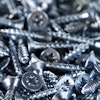BEIJING (AP) — China's premier ruled out allowing a faster rise in its tightly controlled currency to cool surging inflation, saying Monday that Beijing has to consider the impact on Chinese companies and jobs.
Premier Wen Jiabao repeated Chinese complaints that the U.S. Federal Reserve's efforts to spur American growth are partly to blame for global inflation, though he avoided mentioning the Fed by name.
Chinese prices rose 4.9 percent in February, driven by an 11 percent jump in politically sensitive food costs despite government efforts to increase supplies and curb a bank lending boom that analysts say is partly to blame.
Wen rejected letting the yuan rise faster against the dollar, a move analysts say could cool prices by making oil and other imports cheaper in Chinese currency terms. Beijing has restrained the yuan's rise since the 2008 global crisis to help exporters that employ millions of workers compete abroad.
"The appreciation of the Chinese currency should be a gradual process, because we must bear in mind its impact on Chinese businesses and our employment situation," Wen said at a news conference that followed the closing of the annual session of China's legislature.
Inflation is politically dangerous for China's leaders because it erodes economic gains on which the Communist Party bases its claim to power. Consumer prices are especially sensitive in a society where poor families spend up to half their incomes on food.
"The government has confidence that we will be able to anchor inflation expectations," Wen said. But echoing forecasts that inflation is likely to rise further before declining, he added, "We still face a difficult situation in the first half of this year."
Also Monday, China's central bank said bank lending fell in sharply February, indicating official curbs are finally reining in a credit boom that is pushing up real estate and stock prices. The bank said February lending fell 26 percent from the same month last year to 535.6 billion yuan ($81.5 billion).
Beijing faces pressure from Washington and other trading partners to ease currency controls that they say keeps the yuan undervalued, giving China's exporters an unfair price advantage and swelling its multibillion-dollar trade surplus.
Wen said Chinese prices are being driven partly by global inflation. He repeated Chinese complaints about "quantitative easing," the Fed's term for its strategy of trying to push down interest rates and spur growth with multibillion-dollar bond purchases.
Regulators in some Asian economies complain lower interest rates and a weaker dollar caused by the Fed have prompted an influx of money in search of higher returns, pushing up commodity prices. Analysts say China's currency controls have shielded it from such inflows but it still faces higher prices for oil and other imports.
"Some countries have pursued quantitative easing and that has caused drastic fluctuations in the exchange rates of some major currencies and in global commodities prices," Wen said.
"Imported inflation has had a big impact on China and is a factor that is not easy to control."


















